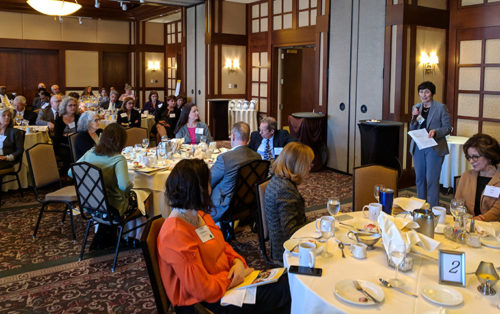Following the success of our recent collaborations with the University of Massachusetts — Who Will Care? The Workforce Crisis in Human Services in 2017 and The Fact of the Human Services Sector: Our Caring Workforce in 2018 — the Providers’ Council again worked with the UMass Donahue Institute and UMass Dartmouth to examine the major threats to the sustainability of the human services sector.
Our third report in as many years, Health through Human Services, also includes potential North Star initiatives that the Council and its members believe are most critical to address the identified threats. These initiatives include work that must be done within the sector as well as efforts that require cross-sector and government partnerships to make them a reality.
The Providers’ Council and its board of directors were inspired by the Alliance for Strong Families and Communities and the American Public Health Association who released a landmark report last year entitled A National Imperative: Joining Forces to Strengthen Human Service in America. As they outlined their major North Star initiatives on a national scale, the Providers’ Council wanted to explore which North Star initiatives would make a difference for human services here in Massachusetts.
Much like our past reports, the research in Health through Human Services explores a sector which – despite numerous workforce challenges – continues to provide quality, essential care to one-in-ten Massachusetts residents. Some major statistics include:
- Employment growth in the human services industry between 2006 and 2016 (74,192 new jobs) accounted for one third of the growth in total Massachusetts employment during that period and 52 percent of all growth in healthcare and social assistance employment.
- Workforce estimates suggest that approximately 150,000 workers provide essential support to the health and well-being of individuals and families in all 351 communities of the Commonwealth. This estimated number of human service workers fall short of employment – 178,137 – which refers to the total number of positions available, note the total number filled or total number of workers.
- Those 178,137 human services jobs generated $4.6 billion in annual payroll in 2016, representing 2.3 percent of the Commonwealth’s total payroll.
- In 2016, the median hourly wage of Massachusetts workers with a high school diploma was $15.12. In contrast, the median hourly wage among the lowest paid human services workers – including PCAs, home health aides, and social and human service assistants – is less than that of all workers with high school diplomas.
- More human services workers earn below 150 percent of the federal poverty level (12.7 percent) than workers in all other Massachusetts industries. Human services workers are nearly twice as likely as healthcare workers to earn below 150 percent of the federal poverty level.
- Median wages for the human services workforce are just over $27,000, compared with a median wage of $40,500 for all other industries in the state.
Further, the report details the advent of value-based reform in Massachusetts, Accountable Care Organizations, the MassHealth Community Partners program and the critical role of human services in addressing social determinants of health. We welcome a discussion around these issues of importance that we believe will affect the human services sector and the workers, clients and families who may be impacted by the changes.
The members of the Providers’ Council’s Research Committee deserve special recognition for lending their time and expertise to help develop this report: Chair David Jordan, Seven Hills Foundation; John Larivee, Community Resources for Justice; Bill Lyttle, The Key Program; Michael Moloney, HMEA; Jackie Moore, North Suffolk Mental Health Association; Andy Pond, Justice Resource Institute; Lauren Solotar, The May Institute; and Michael Weekes, Providers’ Council.
The staff of the University of Massachusetts Donahue Institute and UMass Dartmouth has been timely, responsible, personable and patient. We especially thank UMass representatives and report authors Christina Citino and Michael Goodman for their time, effort and expertise.
Special thanks to staff member Bill Yelenak who helped manage the process.
We hope Health through Human Services illuminates several major issues – and potential North Star initiatives – in the human services sector in Massachusetts and assists in the understanding of this incredible undertaking.
Jackie K. Moore, Ph.D.
Chair, Board of Directors
Providers’ Council
David A. Jordan, DHA, MPA
Chair, Research Committee
Providers’ Council
Michael Weekes, M.S.W.
President/CEO
Providers’ Council

